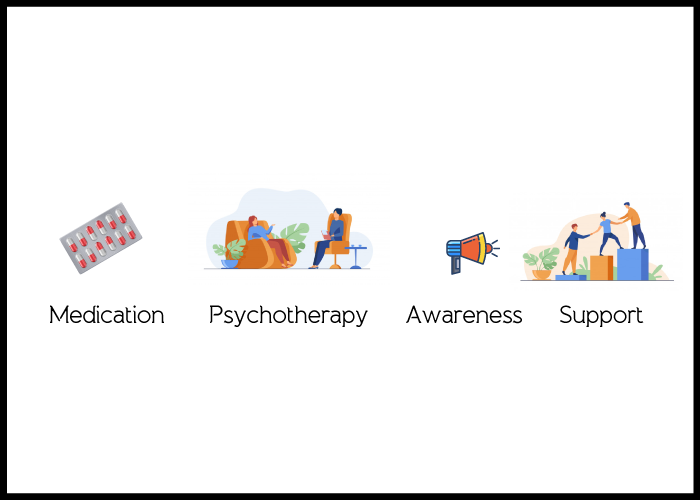
Bipolar Disorder: What You Need to Know About It
While mental health continues to be one of the most prevalent health issues across the world, it remains one of the most stigmatized. Mental health and substance use disorders make up about 10% of the health burdens in the world, but there are only 0.01 psychiatrists per 100,000 people in the world.
In the past decade, there has been a lot of efforts made by experts, celebrities, and even TV shows and movies to bring attention to the cause and normalize the conversation surrounding mental health. However, they continue fighting decades of stigma, misinformation, and inaccurate portrayals in pop-culture.
With increasing awareness and a rise in the number of diagnoses taking place, it is important to take time to understand the mental disorders and how to deal with them. Every year, about 45 million people are colored with bipolar disorder worldwide. Yet, there is very little information available for people who want to understand what having bipolar disorder means.
Many notable personalities and celebrities with bipolar disorder have come forward to talk about the issue and to draw attention to the lack of research and resources for all those who struggle with the condition. These names include the likes of Mariah Carrie, Demi Lovato, Russell Brand, and Kanye West.
So what is Bipolar Disorder?

Bipolar Disorder is a mental disorder that is characterized by sudden and sometimes drastic mood swings, energy, and activity levels. The mood swings range from manic highs to depressive lows and it tends to affect the day to day functioning of any individual who suffers from it. Due to the presence of manic episodes or ‘highs’, bipolar disorder tends to remain undiagnosed and patients take time to identify their behavior and seek help.
What causes bipolar disorder?
While the exact reason for the symptoms of bipolar disorder is unknown, studies suggest that there is some correlation with genetic factors. Genetic factors account for 60 to 80 percent of the cause of bipolarity. Other factors such as environment, substance abuse, and chemistry also play a role in causing bipolarity.
What are Bipolar Disorder Symptoms?
Bipolar disorder is usually characterized by mood episodes that vary from manic highs to depressive episodes. These mood episodes cause a shift in energy, interest, and can affect a person’s ability to perform daily tasks. Mood episodes can last for several months. Manic episodes are usually characterized by high energy, reduced need for sleep, impulsive acts, grandiose delusions, risky behavior, and a distorted sense of self.
Symptoms of a depressive episode include low motivation and energy, loss of interest in everyday activities, suicidal ideation, and recurrent thoughts of death.
What are the types of Bipolar Disorder?
It is a common misconception that bipolarity is limited to mood swings and that they are drastic. Depending on the type, bipolar disorder symptoms may vary from person to person. Here are four different types of bipolar disorder-
-
Bipolar Type 1 – This type of bipolar disorder is characterized by severe mood swings either manic or depressive in nature
-
Bipolar type 2- This type of bipolarity is defined as a milder episode of hypomania and severe depressive episodes.
-
Cyclothymic Disorder- with this a type of bipolar disorder, patients experience hypomanic and depressive episodes that last for a shorter duration and are milder.
-
Mixed Bipolarity is characterized by highs and lows occurring at the same time or within the same episode.
Bipolar Disorder Treatment-

The symptoms and treatment for bipolar disorder varies from person to person, and they may include one or more of the following methods-
-
Medication- bipolar disorder if left untreated tends to progress and the severity of mood episodes tends to increase gradually. Since bipolarity is defined as a chronic condition, medication may play an important role in regulating moods and helping tackle the symptoms of bipolar disorder.
-
Psychotherapy- medication alone cannot help control the symptoms of bipolarity. It is important to seek professional help in order to monitor your moods, understand your symptoms, and adopt ways to deal with it.
-
Awareness- one of the most important aspects of managing bipolar disorder is understanding your symptoms, observing and monitoring your moods, and making sure you have sufficient coping mechanisms in place to make sure you can help yourself deal with the symptoms of bipolar disorder.
-
Support – it is important to surround yourself with people who understand your condition and can help you deal with your symptoms in the right way. A support system may consist of close friends, family, and a support group.
How to help someone struggling with Bipolar Disorder?
There are several ways you can support your loved ones who are struggling with this debilitating condition. Making sure you understand the condition and the impact it has on their daily life is a big step towards being helpful. Asking them what they need from you, helping them notice mood shifts and to make an effort to help them get through their depressive phase.
You can also help them through a manic phase by helping them make a rational decision by asking them to reason or justify their decisions and to positivity push them to introspect may help them deal with their condition with greater ease.
If someone around you is suffering from one or more of these symptoms and you suspect they have bipolar disorder, reach out to a professional, and seek help.
It is possible to lead a healthy and happy life despite the presence of Bipolar condition. Take action today.